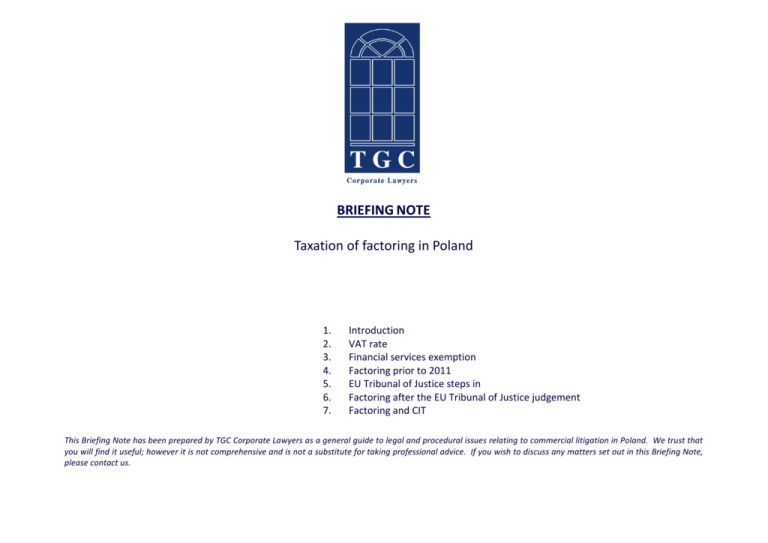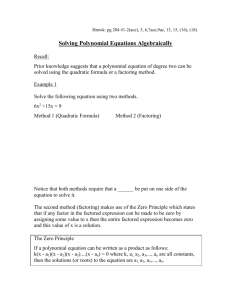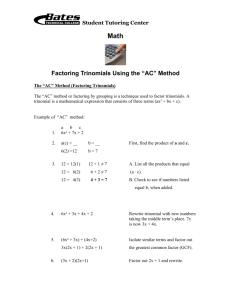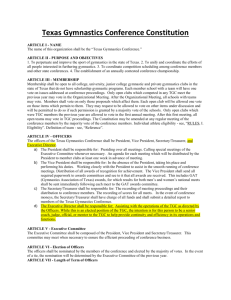
BRIEFING NOTE
Taxation of factoring in Poland
1.
2.
3.
4.
5.
6.
7.
Introduction
VAT rate
Financial services exemption
Factoring prior to 2011
EU Tribunal of Justice steps in
Factoring after the EU Tribunal of Justice judgement
Factoring and CIT
This Briefing Note has been prepared by TGC Corporate Lawyers as a general guide to legal and procedural issues relating to commercial litigation in Poland. We trust that
you will find it useful; however it is not comprehensive and is not a substitute for taking professional advice. If you wish to discuss any matters set out in this Briefing Note,
please contact us.
Briefing Note: Factoring in Poland
Introduction
Factoring is a legal relationship with three participating entities:
•
factor (most frequently a bank),
•
entrepreneur (seller) who within the scope of his business activity sells goods or provides services with deferred payment period,
•
customer of the seller (debtor).
The factor purchases from the seller receivables of a usually commercial nature prior to the receipt of the payment from the debtor. Due to
this, factoring constitutes one of the methods of financing the business activity of the entrepreneur. The factor who that purchases
receivables from the seller supports the financial liquidity of the latter and performs for him additional services.
The factoring contract is an innominate contract. It combines elements of various contracts from the Civil Code, e.g. contract of assignment
of receivables and contract of mandate. Within the scope of the factoring contract the factor also undertakes to perform additional actions
which are not directly related to the assignment itself. What constitutes the essence of the factoring contract is also the remuneration
collected by the factor.
VAT rate
Financial services
exemption
VAT exemptions provided for financial services do not apply to debt collection activities. They are subject to the basic 23% VAT rate.
Pursuant to the VAT Act, numerous types of financial services are VAT-exempt. The exemption applies also in the case where particular
services are a specific and necessary component of another VAT-exempt service and, at the same time, constitute a separate whole
themselves.
However and as per express wording of the statutory provisions, debt collection activities, including factoring, are excluded from this
exemption. Therefore, they are subject to the basic VAT rate, currently at 23%.
Factoring prior to 2011
Until 2011 it was assumed that in the case of the factoring service it was the purchase of the commercial receivable by the factor from the
entrepreneur (seller) that was first of all subject to tax. Therefore, the basis for taxation was the difference between the nominal value of the
receivables and the value paid by the factor to the original creditor (seller). If due to the purchase of the receivables within the scope of the
factoring contract the remuneration (apart from or instead of the discount) was also paid in the form of interest, it was assumed that it did
not constitute a separate financial service which would be subject to a VAT exemption. Tax authorities emphasized that such interest
Information in this Briefing Note is intended to provide only a general outline of the subjects covered and is believed to be correct at the date of printing. It should neither be regarded as comprehensive and sufficient
for making decisions, nor be used in place of professional advice. Neither TGC Corporate Lawyers nor any other group entity, accept any responsibility for losses arising from any action taken or omitted to be
taken by anyone using this Briefing Note.
TGC Corporate Lawyers
All rights reserved – 2014
TGC is a registered trademark.
www.tgc.eu
Briefing Note: Factoring in Poland
constituted a component of the remuneration for the factoring services and, as such, was subject to VAT.
EU Tribunal of Justice
steps in
However, such an approach changed after the judgment of the EU Tribunal of Justice of 2011 in the case of GFKL Financial Services AG C93/10. The Tribunal concluded that although the purchase price of the receivable agreed by the parties to the assignment contract was
lower than its nominal value and, at the same time, the difference between the two reflected the actual economic value of the receivable at
the time of sale and, hence, one could not talk about provision of services for remuneration.
This applies only to a sale of receivable from the original creditor and, hence, sale of a receivable purchased from the original creditor (seller)
will, generally, constitute a transaction subject to VAT.
Interest (other than penal interest) or other charges agreed by the parties as the remuneration for the factoring services will continue to be
subject to the 23% rate, but not the discount itself.
Factoring after EU Tribunal
of Justice judgement
In consequence of the aforesaid judgment of the Tribunal, the assignment of receivables in the implementation of the factoring contract may
be subject to tax on civil-law transitions (stamp duty). It will be the case, if the assignment is made in the form of one of the contracts listed
in the Act in Tax on Civil-Law Transactions, e.g. purchase contract. In other cases tax will not be due.
Generally, in the case of factoring services the taxable event in VAT is service performance, namely receivable purchase. However, if the
remuneration for factoring was not paid in the form of the discount at the purchase of the receivable but rather in a different form after it
has been purchased already, then it seems that the taxable event in VAT would take place not earlier than at that time.
If the supplier of services for a Polish VAT taxpayer is an entity not registered for VAT purposes in Poland, then the purchaser is required to
settle the said services on a reverse-charge basis. He shows input and output VAT in the tax declaration for the month/quarter when the
taxable event took place. If the purchaser uses the services for the purposes of transactions subject to VAT, then he may deduct input VAT
from the output VAT on general terms.
After the assignment of the receivable the seller will be able to decrease his tax liabilities by the discount or interest and, possibly, other
charges agreed by the parties.
Factoring and CIT
The very payment of the receivable by the factor will not be taxable income for the entrepreneur (seller), provided that he has recognised
that income earlier and has made no correction in this respect to date.
The income for the factor in this case will be the amount due received as a result of collection or sale of the receivable as well as interest and
Information in this Briefing Note is intended to provide only a general outline of the subjects covered and is believed to be correct at the date of printing. It should neither be regarded as comprehensive and sufficient
for making decisions, nor be used in place of professional advice. Neither TGC Corporate Lawyers nor any other group entity, accept any responsibility for losses arising from any action taken or omitted to be
taken by anyone using this Briefing Note.
TGC Corporate Lawyers
All rights reserved – 2014
TGC is a registered trademark.
www.tgc.eu
Briefing Note: Factoring in Poland
other charges. The tax deductible costs, on the other hand, will be the expenses for the purchase of the receivable.
In the case of Polish CIT taxpayers, income from factoring will be subject to tax on general terms, namely at the 19% rate.
If any of the parties to the factoring contract is a foreign entity, a treaty on avoidance of double taxation may apply. What needs to be
examined on its basis is, first of all, whether there are any exemptions and/or reduced rates available.
Information in this Briefing Note is intended to provide only a general outline of the subjects covered and is believed to be correct at the date of printing. It should neither be regarded as comprehensive and sufficient
for making decisions, nor be used in place of professional advice. Neither TGC Corporate Lawyers nor any other group entity, accept any responsibility for losses arising from any action taken or omitted to be
taken by anyone using this Briefing Note.
TGC Corporate Lawyers
All rights reserved – 2014
TGC is a registered trademark.
www.tgc.eu
Briefing Note: Factoring in Poland
Contact Details
TGC Corporate Lawyers is an international full-service law firm providing professional, constructive and cost-effective advice and assistance to clients. We are one of the
leading law firms in Poland and we act on a wide range of transactions, including high-value, complex and ground-breaking transactions and deal with various contentious
issues which may emerge in relation with our clients’ activities.
Beata Ordowska
Advocate, General Partner
TGC Corporate Lawyers
ul. Hrubieszowska 2
01-209 Warsaw
Poland
Tel: +48 22 295 3300
Email: bordowska@tgc.eu
Nicholas Fielding
Senior Partner
TGC Corporate Lawyers
ul. Hrubieszowska 2
01-209 Warsaw
Poland
Tel: +48 22 295 3300
Email: nfielding@tgc.eu
Warsaw
ul. Hrubieszowska 2
01-209 Warsaw, Poland
Tel.: +48 22 295 3300
Fax: +48 22 295 3301
Wrocław
ul. Legnicka 51-53
54-203 Wrocław , Poland
Tel.: +48 71 733 1313
Fax.: +48 71 733 1314
Łódź
ul. Nawrot 114
92-029 Łódź, Poland
Tel.: +48 42 671 8560
Fax.: +48 42 671 8561
Prague
Hybernská 32/1271
110 00 Prague, Czech Republic
Tel.: +420 221 111 611
Fax.: +420 221 111 612
Brno
Česká 17
602 00 Brno, Czech Republic
Tel.: +420 542 425 821
Fax.: +420 542 425 822
Bratislava
Karadžičova 16
821 08 Bratislava, Slovenská Republika
Tel.: +421 2 52 444 010
Fax.: +421 2 54 645 032
Kraków
ul. Smoleńsk 18/1
31-112 Kraków, Poland
Tel: +48 12 334 91 00
Fax: +48 12 334 91 01
Information in this Briefing Note is intended to provide only a general outline of the subjects covered and is believed to be correct at the date of printing. It should neither be regarded as comprehensive and sufficient
for making decisions, nor be used in place of professional advice. Neither TGC Corporate Lawyers nor any other group entity, accept any responsibility for losses arising from any action taken or omitted to be
taken by anyone using this Briefing Note.
TGC Corporate Lawyers
All rights reserved – 2014
TGC is a registered trademark.
www.tgc.eu










